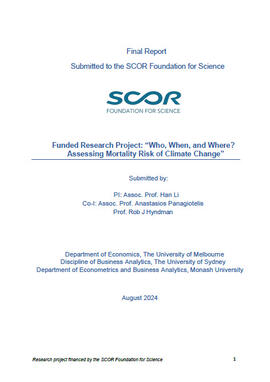
Running from 2023 to 2024, this project is led by Han Li, Associate Professor in the Department of Economics at the University of Melbourne, Australia. The primary objective is to obtain a richer understanding of how mortality risk is affected by climate change. To do this, the research looks at three key questions:
- Who are the excess deaths? – Find the age groups that are particularly sensitive to climate change;
- When do excess deaths occur? – Determine if more excess deaths occur in winter or summer months; and
- Where are the excess deaths? – Identify regions that are most vulnerable to climate change.
The researchers propose a cutting-edge Bayesian modelling approach to estimate the non-linear relationship between mortality and temperature. This new approach addresses the following challenges in quantifying mortality risk due to extreme temperatures:
- The relationship is non-linear;
- This non-linear relationship may also vary by geography and cause of death;
- There is a need to control for spatial factors which can confound the relationship between temperature and mortality.
Illustrating the impact of extreme and persistent temperatures on mortality risk, this final report summarizes the main findings of the project.
